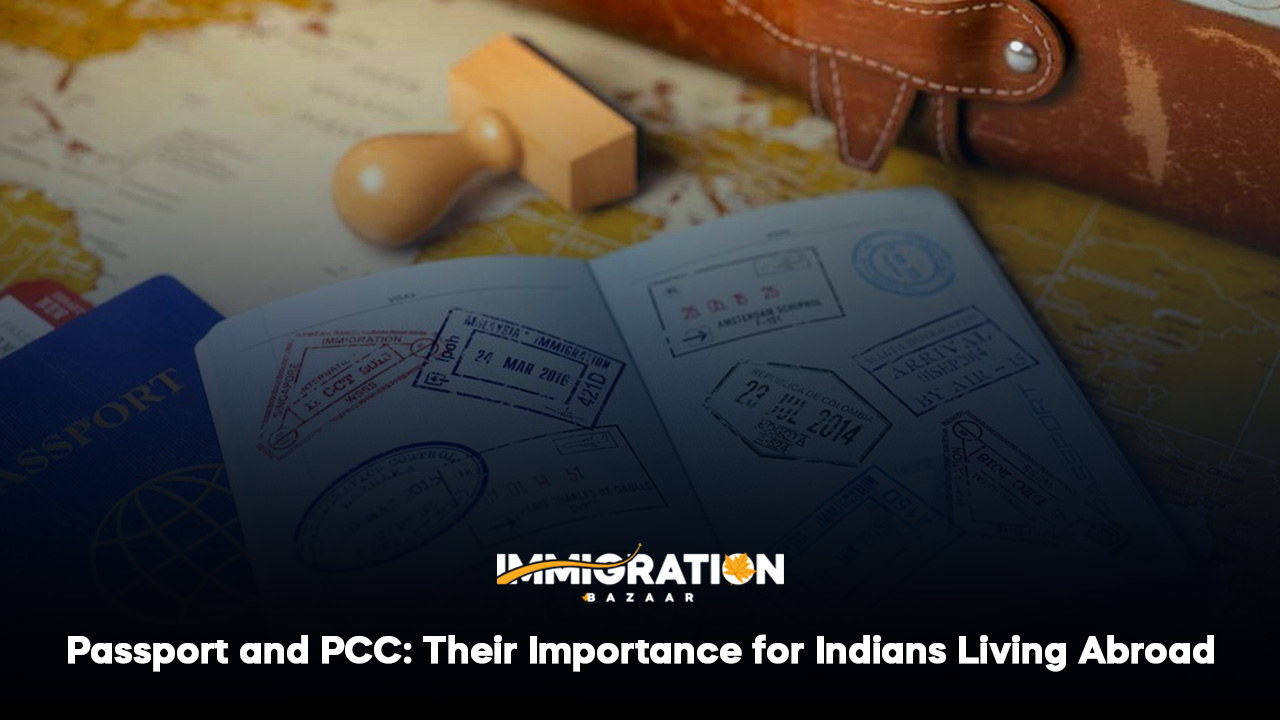Passport and PCC: Their Importance for Indians Living Abroad
The incident involving a corrupt official in Kheda, Gujarat, demanding an exorbitant bribe from a father for a Police Clearance Certificate (PCC) has cast a spotlight on the challenges faced by Indians living abroad, particularly when dealing with passport-related issues. This case underscores the importance of transparency in government processes and the need for vigilance among citizens. While the Indian government has streamlined many aspects of the passport application process in recent years, corruption and bureaucracy remain significant obstacles for some citizens, especially those abroad.
For Indians living overseas, losing a passport can be a stressful experience. A passport is not only a travel document but also an essential form of identification that can impact one’s legal status in a foreign country. In such cases, the process of obtaining a new passport or a PCC becomes critical, yet it can be marred by inefficiency, red tape, and in some unfortunate instances, corruption. This article will explore the issues surrounding the passport reissuance process, the role of Police Clearance Certificates (PCCs), and the broader implications of corruption in such matters.
A passport is a critical document for anyone living outside their home country. It serves as proof of identity and citizenship and is required for various purposes, including travel, employment, and legal residency. For Indian expatriates, the passport is often the most important link to their home country, facilitating access to consular services, voting rights, and social security benefits. Losing this document can create significant legal and personal hurdles, including issues related to immigration status, employment, and even banking in the host country.
In many cases, obtaining a new passport after the loss or theft of the original one involves more than just submitting a simple application. Depending on the circumstances, the Indian consulate or embassy may require the applicant to provide additional documents, including a Police Clearance Certificate (PCC). A PCC is an official document that certifies that the applicant has no criminal record and is often necessary for various visa-related matters, including work permits, residence permits, and passport renewals in some cases.
For expatriates who lose their passports abroad, obtaining a PCC from local authorities in India can be challenging, as it involves navigating a complex bureaucratic process. Typically, the process includes visiting a police station, filing an application, and waiting for the clearance. Unfortunately, this process is sometimes tainted by corrupt officials who exploit the urgency and vulnerability of applicants.
The Corruption Issue: The Case of Kheda, Gujarat
The case in Kheda, Gujarat, where a police officer demanded a bribe of ₹40 lakhs for a PCC, is a stark reminder of how corruption can infiltrate even essential services. In this particular incident, the father of an Indian expatriate whose son lost his passport in the United States sought assistance in obtaining the necessary Police Clearance Certificate. The police officer in charge, seeing an opportunity, demanded an exorbitant bribe of ₹40 lakhs for providing the clearance. After negotiations, the amount was reduced to ₹5 lakhs. However, instead of succumbing to the corrupt demands, the father contacted the Anti-Corruption Bureau (ACB), which led to the officer being caught red-handed during a sting operation.
This case illustrates a common problem in many parts of the world, where corruption in government offices can delay or complicate routine processes. For Indians abroad, especially those who may not be familiar with the nuances of Indian bureaucracy, such demands can be both shocking and financially crippling. The demand for a bribe of ₹40 lakhs (approximately $48,000) is outrageous by any standard and reveals the extent to which some officials are willing to exploit the system for personal gain.
While this case had a successful outcome, thanks to the father’s decision to contact the ACB, it raises broader questions about how often such corruption occurs and the options available to those who face similar situations. It also underscores the importance of reporting such incidents to authorities to ensure that corrupt officials are held accountable.
The Role of the Anti-Corruption Bureau (ACB)
The Anti-Corruption Bureau (ACB) is an important agency in India tasked with investigating and prosecuting cases of corruption involving public officials. The ACB plays a crucial role in ensuring accountability in the public sector and protecting citizens from corrupt practices. The success of the ACB in the Kheda case highlights the importance of vigilance among citizens and the need for prompt action when faced with corruption.
The ACB operates by conducting investigations based on complaints received from citizens or through proactive measures. When a complaint is lodged, the ACB investigates the allegations, often using undercover operations or “trap” procedures, as in the Kheda case, to catch corrupt officials in the act. The ACB’s role in ensuring justice in this case sends a strong message to public officials who may be tempted to engage in corrupt practices.
Reporting Corruption: Steps and Legal Framework
For Indians, whether at home or abroad, reporting corruption is crucial to ensure that justice is served and corrupt officials are brought to account. The legal framework for tackling corruption in India has improved over the years, with several laws and regulations aimed at promoting transparency and accountability. The Prevention of Corruption Act, 1988, for example, provides a legal basis for prosecuting public officials involved in corrupt practices. Additionally, the Lokpal and Lokayuktas Act, 2013 established independent bodies to investigate allegations of corruption at various levels of government.
For expatriates or their family members who encounter corruption while dealing with government agencies, there are several steps they can take to report the issue:
- Contacting the Anti-Corruption Bureau (ACB): As demonstrated in the Kheda case, the ACB is an effective agency for dealing with corrupt public officials. Citizens can contact the local ACB office to lodge a complaint. Many ACB offices have dedicated helplines, websites, and email addresses to facilitate the reporting process.
- Filing a Complaint with Higher Authorities: If corruption is encountered within a police station, individuals can file a complaint with senior police officers or the district magistrate’s office. In some cases, the complaint can also be escalated to the Ministry of External Affairs if it involves officials from Indian embassies or consulates abroad.
- Using Online Portals and Helplines: The Indian government has launched various online platforms to facilitate the reporting of corruption. The Central Vigilance Commission (CVC), for instance, has an online portal where citizens can report corrupt practices. Similarly, several state governments have developed e-governance systems to receive complaints.
- Whistleblower Protections: The Whistleblowers Protection Act, 2014 provides safeguards for individuals who report corruption, ensuring that they are not subjected to retaliation. This law is particularly relevant for government employees or others who may face personal risks when exposing corruption.
- Engaging Media and Public Awareness: In some cases, involving the media can help bring attention to incidents of corruption, putting pressure on authorities to take action. Journalists and public interest groups often play a crucial role in exposing systemic corruption and advocating for reforms.
Challenges Faced by Indian Expatriates
Indians living abroad often face unique challenges when dealing with passport-related issues, especially when their documents are lost or stolen. In many cases, dealing with Indian consulates or embassies can be a slow and cumbersome process, requiring extensive paperwork and personal visits. Additionally, when additional documents such as Police Clearance Certificates are required, the complexity increases, particularly if the individual is in a foreign country and unable to visit India to manage the process personally.
Corruption only adds to these challenges. The demand for bribes by officials, whether in India or at diplomatic missions abroad, can delay the process, lead to financial losses, and create significant stress for the individuals involved. This is particularly problematic for expatriates who may have limited time or resources to deal with such issues, as many are bound by visa requirements, work obligations, or other legal constraints in their host country.
Moreover, for many Indians living abroad, especially those from rural areas or small towns, navigating the complexities of Indian bureaucracy can be daunting. In many cases, individuals rely on family members in India to handle paperwork and deal with officials. This opens the door to potential exploitation, as unscrupulous officials may see the distance between the applicant and their home country as an opportunity to demand bribes.
Solutions and Recommendations
While the Indian government has taken steps to improve transparency and reduce corruption in public offices, much work remains to be done, especially in the context of services provided to expatriates. Some potential solutions to address these issues include:
- Digitalization of Passport Services: The government should continue to expand the digitalization of passport and visa-related services, ensuring that individuals can complete most of the process online without the need for in-person visits. This would reduce opportunities for corruption by minimizing direct interactions between applicants and officials.
- Streamlined PCC Process: The process of obtaining a Police Clearance Certificate should be streamlined and made more transparent, with clear guidelines and timelines provided to applicants. The use of technology, such as online tracking systems, could help reduce delays and prevent corruption.
- Anti-Corruption Awareness Campaigns: Public awareness campaigns should be launched to inform citizens, both in India and abroad, about their rights and the steps they can take to report corruption. This would empower individuals to take action when faced with corrupt demands.
- Stronger Oversight of Diplomatic Missions: The Ministry of External Affairs should increase oversight of Indian consulates and embassies, ensuring that services provided to expatriates are efficient and free from corruption. Periodic audits and inspections could help identify problem areas and address them before they escalate.







